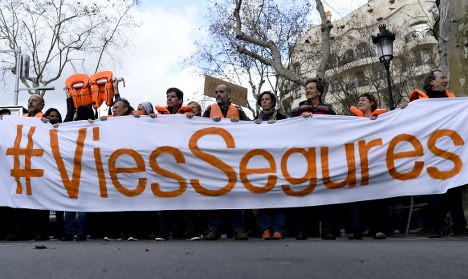Half a year after Barcelona launched a municipal plan to welcome refugees fleeing wars in places like Syria and Iraq, Spain’s second largest city is still waiting for them to arrive.
“This fills us with rage,” Barcelona Mayor Ada Colau, a former activist born out of the anti-austerity Indignados protest movement, told AFP.
“The city is ready at the technical level, all our services are ready and residents are waiting with open arms. But they don’t arrive.”
While EU interior ministers gathered in Brussels this week to try to hammer out a unified response to the biggest migration crisis in the bloc’s history, the city detailed its own “Barcelona Refuge City” plan.
When Colau announced the initiative in August, hundreds of residents of the Mediterranean, seaside city flooded the city hall with e-mails volunteering to help.
The plan was quickly followed by other cities across the country including Madrid, the Mediterranean port of Valencia and Cadiz in the southwest.
“But since then, just 18 have arrived (in the whole of Spain), a ridiculous figure,” said Pascale Coissard, spokeswoman in the northeastern region of Catalonia for the country’s Commission for Refugee Aid.
The agency has for months prepared to receive a chunk of the over one million people who have arrived in Europe fleeing from Syria, Iraq, Afghanistan or Eritrea.
It boosted the number of places able to welcome refugees in Catalonia — the capital of which is Barcelona — to 41 from ten and will shortly open 50 more.
The agency has also reinforced its medical and psychological services and it is training municipalities in the region how best to deal with newly arrived refugees.
– ‘Working blindly’ –
The Catalan branch of the Red Cross, meanwhile, is recruiting social workers, interpreters and employment consultants and has set up three reception centres with up to 200 places for emergency situations.
“We are ready,” said Oscar Barbero, head of social services for the local branch of the Red Cross.
“But we are working blindly, without knowing when they will arrive, how they will arrive or how many will arrive.”
The main problem is that Spain’s central government “is not providing any information,” said Ignasi Calbo, coordinator of the “Barcelona Refuge City” plan, for which 10.5 million euros ($11.6 million) has been set aside.
And Brussels and European nations are also dragging their feet.
In late September, European leaders agreed on a plan to relocate 160,000 migrants from the countries they’re flooding into — mainly Greece and Italy.
But it has so far relocated just 600 — an unacceptable situation for Colau.
“In the summer we will go to the beach for a swim, in the same sea where each week people die because Europe is not providing safe passage,” she said.
“And while it does not, it will be an accomplice to these human trafficking mafias and boat sinkings.”
– ‘Get tired of waiting’ –
As a result, Barcelona wants European cities to grab hold of the issue.
For the past few months, it has been working with associations representing European cities, such as Eurocities or Metropolis, to pressure European institutions to act.
Now they will move to direct action, said Colau.
Barcelona city hall is finalising cooperation agreements with municipalities which have been overwhelmed by the arrivals of migrants, such as Athens and Lesbos in Greece or Lampedusa in Italy.
“But there will come a time when cities get tired of waiting,” said Calbo, hinting local authorities may assume some responsibilities in areas of asylum that belong to the central government in Madrid.
“It is a state duty but there is a humanitarian level which we cannot forget. And human rights are above European legislation,” he added, without giving further details.
Source: thelocal



